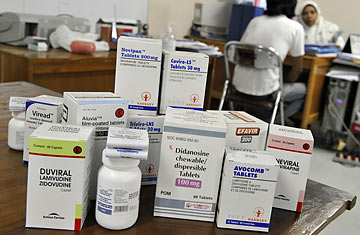
A supply of antiretroviral drugs is prepared for free distribution to HIV patients at the Integrated HIV Service Unit at the Cipto Mangunkusumo government hospital in Jakarta, Indonesia
Last January a team of scientists at the World Health Organization (WHO) published a study in the British medical journal the Lancet making the audacious claim that the tools already exist to end the AIDS epidemic. Doctors have long noted that antiretrovirals — the drugs commonly used to treat HIV — are so successful at suppressing the number of viruses in an infected patient's blood that they can render a person no longer contagious. Using mathematical models, the researchers claimed that universal HIV testing followed by the immediate treatment of newly infected patients with antiretroviral drugs could eliminate the disease from even the most heavily infected populations within 10 years.
But a new study in the journal Science suggests that such thinking is too good to be true. And the problem is drug resistance. Extensive antiretroviral treatment can result in the development and transmission of drug-resistant strains of HIV — something the Lancet study did not consider. In the new study, published on Thursday, a team of scientists from the University of California, the University of Tennessee and the University of Ottawa analyzed data from San Francisco, where antiretroviral drugs have been extensively prescribed to HIV patients since AZT was introduced in 1987. In that city, drug resistance has grown steadily and, according to the team's models, drug-resistant infections are now on the verge of spiking.
"According to our models, drug resistance in San Francisco will increase by around 30% in the next three to five years," says Sally Blower, a professor at the David Geffen School of Medicine at UCLA. "That will present its own challenges to that city, but the most significant implications of our work are for countries where treatment is just being rolled out. San Francisco is always the canary in the mine."
Current treatment guidelines do not call for the prescription of antiretroviral drugs until there is evidence of progressive damage to the immune system. But in the wake of last year's Lancet study, some health experts have begun promoting a "test and treat" policy for populations with high HIV rates, as in major Western cities and parts of the developing world. Test and treat calls for the immediate treatment of all HIV-infected patients to reduce transmission rates. In November, WHO held a conference in Geneva to discuss whether the policy should be rolled out through its various agency programs. According to the team behind the Science study, however, that could prove disastrous. "Test and treat has been designed based on overly simplistic modeling. It is misguided and could lead to very serious public-health problems in resource-constrained countries," Blower says.
Jim Kahn, a professor of medicine at the University of California, San Francisco, and a contributor to the Science study, says test and treat should not be confused with WHO's goal of universal access to antiretroviral drugs, which he says is a worthy one. But because the treatment for drug-resistant HIV strains is expensive — it requires a constantly changing cocktail of new, pricey drugs — and because adherence to such a complicated drug regimen can be difficult for patients, Kahn believes WHO and other institutions should begin planning for the time that HIV drug resistance begins in earnest, particularly in developing economies. "This is a clarion call. Treatment saves lives. But we have to make a plan for when treatment fails. How will we pay for combined therapy? How can we ensure patients adhere to the treatment? These are questions that require more attention," he says.
Alvaro Bermejo, executive director of the International HIV/AIDS Alliance, says the new study underlines the increasingly urgent need for the development of an effective HIV vaccine, which has so far eluded researchers. He also says that because the study provides evidence showing that drug resistance will continue to rise in developing countries, it will likely increase pressure on pharmaceutical companies to join "patent pools" for their more expensive second- and third-generation antiretroviral drugs. In such an arrangement, an umbrella organization like UNITAID manages a pool of patents that allows generic producers to make second- and third-generation drugs at an affordable price for developing countries. The UNITAID board, backed by Britain, France, Brazil, Norway and Chile, has just agreed to set up a patent pool for AIDS drugs, but the success of the venture depends on the cooperation of pharmaceutical companies.
Whatever happens, the new study suggests that HIV therapy is only going to become trickier and more expensive to implement as drug resistance spreads. While the implications for this trend will be felt most acutely in sub-Saharan Africa and parts of Asia, Kahn says he also has concerns for his home city of San Francisco. "California is broke, and the state is invading city finances to help itself out. I look at our model and what it predicts for San Francisco over the next few years in terms of antiretroviral resistance, and I do become concerned that funding is on the chopping block," he says.
